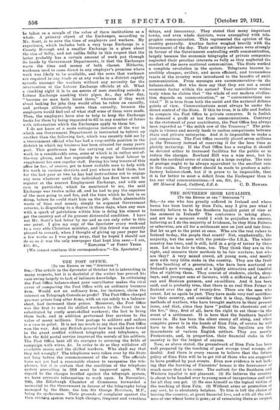THE POST OFFICE.
[To THE EDITOR or THE " SPECTATOR."]
Sia,—The article in the Spectator of October 1st is interesting in many respects, but it is doubtful if the writer has proved his ease owing largely to lack of intimate knowledge. In criticizing the Post Office balance-sheet your contributor makes the vital error of comparing the Post Office with an ordinary business Sm. Would not an ordinary firm, for instance, claim the interest on Telegraph Consols as profit? The Post Office charged pre-war prices long after firms, with an eye solely to a balance- sheet, had increased their prices. Moreover, the Post Office was the first to send its skilled workers to the front (to be substituted by costly semi-skilled workers); the last to bring them back, and in addition performed free services to the value of many millions. Free postage to soldiers and sailors is a case in point. It is not too much to say that the Post Office won the war. Ask any British general how he would have fared in the great conflict without telegraphs and telephones, or how the field postal service improved the morale of his soldiers. The l'ost Office bent all its energies to covering the fields of campaign with wires, &c. In order to do so they withdrew all available stores and the skilled workers. Who shall say that they did wrongly? The telephones were taken over by the State not long before the commencement of the war. The officials have not yet had a reasonable chance to reorganize the tele- phones, but it is certain that the condition of the telephone system prevailing in 1913 must be improved upon. With regard to the charges levelled against the telegraph system, we have accurate information to work upon. In November, 1865, the Edinburgh Chamber of Commerce forwarded a memorial to the Government in favour of the telegraphs being managed by the State, the late Sir George Harrison, M.P., being its spokesman. Their grounds of complaint against the then existing system were high charges, frequent and vexatious
delays, and inaccuracy. They stated that many important towns, and even whole districts, were unsupplied with tele- graphic communication. This represented the opinion of the country generally. Another factor weighed heavily with the Government of the day. Their military advisers were strongly in favour of the Government controlling swift communication, largely because the economic telegraphs of private companies neglected their peculiar interests as fully as they neglected the comfort of the more scattered communities. The State worked a complete revolution in the system. Telegrams became in- credibly cheaper, swifter, and more efficient, and tremendous tracts of tho country were introduced to the benefits of swift communication. Press messages are unremunerative—in the balance-sheet. But who dare say that they are not a sound economic factor within the nation? Your contributor writes truly when he claims that " the whole of our modern civiliza- tion depends on communication," or " communications are vital." It is true from both the social and the national defence points of view. Communications must always be under the direct control of the State. If this be true, it is idle and foolish to compare the Post Office to private concerns. It is foolish to demand a profit or tax from communications. Contrary to the statement of your contributor, the Post Office has always been regarded as " the mileh cow of the Treasury." The prin- ciple is vicious and merely leads to useless comparisons between State and private enterprise. And it is impossible to make a just comparison. The Post Office recently placed seven millions in the Treasury instead of reserving it for the lean time so plainly maturing. If the Post Office has a surplus it should be devoted either to increased facilities for the public or to reduce the charges. Rowland Hill was a wise man, but he made the cardinal error of aiming at a largo surplus. The rate of postage ought to be always equivalent to the smallest coin in the realm. Every effort should be made to produce a satis- factory balance-sheet, but if it prove to be impossible, then it is far better to meet a deficit from the Exchequer than to tax our vital communications.—I am, Sir, &c., 182 Alinard Road, Catford, S.E. 6. C. D. HOWARD.






































 Previous page
Previous page